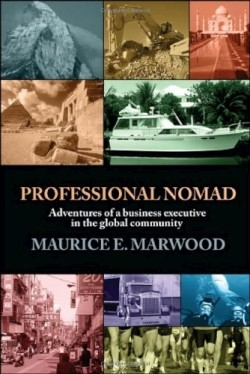Professional Nomad
Adventures of a Business Executive in the Global Community
Maurice Marwood’s mother often urged him to stay close to his Ontario roots and raise his own farm family, but life took him elsewhere. After receiving an agricultural engineering degree in the early 1960s, Marwood was hired by Caterpillar Tractor Co. He climbed the corporate ladder in several US cities, earning his stripes by donning coveralls and climbing aboard the heavy equipment. Eventually he earned an MBA and accepted a customer service position that took his family to Switzerland, Africa, and the Middle East. By the time he was in his mid-thirties, Marwood’s career was in high gear and his travels had already become extensive. And he had only just begun.
Reflecting on his rags-to-riches life and career in Professional Nomad, Marwood credits his mother with teaching him independence and self-reliance—values that he adapted into a lifestyle and a world-view, and that continue to inform his management philosophy. The frame for Marwood’s memoir is his unique corporate career, built on a belief in science, reason, people, and traditional values. He cites Woody Allen’s observation that “eighty percent of success is showing up,” yet Marwood is not one to simply show up. “I need to be in control, to take action, and to show progress,” he explains. In his participative management style, Marwood is the coach; he trains and empowers his people, while focusing their endeavors squarely on the customer. He can be found lecturing engineers in post-Mao China, visiting logging camps in remotest Borneo, and advancing his ideas to employees in Montreal. Congruent with Marwood’s narrative is an explicit running argument that flows directly from his experiences. He idealizes technology, progress, the profit motive, and business for steadily improving the human condition. An admirer of Ayn Rand, he advocates laissez-faire capitalism and a live-and-let-live foreign policy.
Marwood adroitly segues from the tracking of his career to diversions such as long-distance running, climbing expeditions in the Alps and Himalaya, and voyages in the Caribbean and the Intracoastal Waterway of the US. While describing a thrilling experience on a scuba “shark-feeding dive” with his step-son in the Bahamas, he shares his knowledge of shark behavior and offers information about shark-feeding laws in Florida. Contextual information is delivered in an engaging style, and opinions are qualified and supported with personal experience and other evidence. Marwood’s passions reveal a man of boundless energy with an undying curiosity and a can-do attitude. Whether at the helm of his yacht or the helm of a corporation in need of a turnaround, Marwood’s voice and approach are remarkably consistent. Even his last few chapters, concerned with ethics, religion, and politics, are alive with stories and persuasive logic.
Marwood is an authentic American success story. In 2005, at sixty-four years of age and while serving as managing director of Capital Machinery Limited in Taiwan, he climbed Mt. Yushan, the highest peak in Northeast Asia. Having learned that “success is a journey—not a destination,” Marwood would likely argue that success came in the pursuit, rather than the achievement, of his goals.
Disclosure: This article is not an endorsement, but a review. The publisher of this book provided free copies of the book and paid a small fee to have their book reviewed by a professional reviewer. Foreword Reviews and Clarion Reviews make no guarantee that the publisher will receive a positive review. Foreword Magazine, Inc. is disclosing this in accordance with the Federal Trade Commission’s 16 CFR, Part 255.

